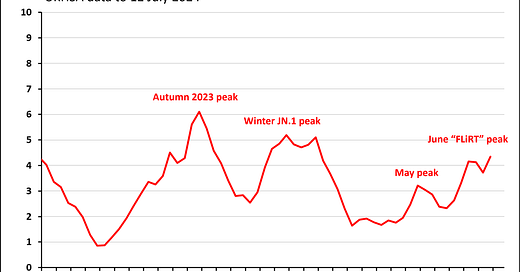England's ongoing Covid wave and new Long Covid research
We're still in a significant wave & important new research on long covid
Despite the Inquiry Module 1 report being released yesterday, this is not a post about that. I have read the report and want to mull it a bit before writing about it - but I will! I Have Thoughts.
So, instead, here is an update on the current Covid situation & some new published research on the likelihood of developing Long Covid.
Current Covid wave in England continues
This “FLiRT” variant wave is not over. While the number of weekly hospital admissions with Covid remains lower than the Christmas JN.1 variant wave and the autumn 2023 Covid wave, it has now remained high for several weeks. This means that there are a lot of people out there getting sick - and having their work, plans and holidays disrupted.
While the most recent week shows an increase in admissions, I don’t expect these increases to continue for two reasons. Firstly, I think there aren’t enough susceptible people left to sustain a much bigger wave (because I think a reasonable proportion of the population have probably been exposed or infected over the couple of months). Secondly, Scottish wastewater data to 9 July appears to show a sharp decrease in the most recent week of data, suggesting that prevalence is on its way down. Obviously Scotland and England can have different dynamics, but it’s the best we’ve got as long as England refuses to analyse its own wastwater.
New Long Covid research
The New England Journal of Medicine just published work from the US Veterans Affairs (VA) health database, following up about 440,000 veterans who tested positive for Covid between March 2020 and January 2022. The researchers looked for changes in the likelihood of developing Long Covid in the year following infection over time, with different variants and with and without vaccination.
Important Context!
Before going throught results, there are some important limitations!
Firstly, the patient population of the VA database is predominantly older white men. Age (older people more likely to develop Long Covid) and sex (women are more likely to develop Long Covid) are both strongly associated with chances of developing Long Covid. This means that the researchers’ results cannot be directly applied to the whole population.
Secondly, the researchers only consider first recorded infections - the infection with the highest risk of developing of Long Covid [Note: some first recorded infections will be reinfections but most will be the actual first infection]. Most of the population (both in the US and the UK) has now had Covid at least once, and so again, the results are not directly comparable to the current situation. We would expect chances of developing new Long Covid to be a bit lower now, with the addition of some protection of previous infections.
What did the researchers find?
Overall, the chance of developing new Long Covid in unvaccinated people on their first recorded infection reduced from about 10.4% to 7.8% from the original variant to the Omicron variant (that arose in December 2021 and swept the world). Being vaccinated reduced your chance of developing Long Covid by about half (to 3.5%) - consistent with previous research on the efficacy of vaccines in preventing Long Covid.
But, as the researchers say, 3.5% of vaccinated people developing Long Covid following their first Omicron infection still represents a really high number, especially given that Omicron infected far more people than the previous variants. It’s also consistent with what see in the UK where a substantial proportion of people with current Long Covid developed it in the Omicron era, despite being vaccinated.
As I pointed out above, the chance of developing new Long Covid now, on your second, third or more infection and assuming you are vaccinated, are almost certainly lower than 3.5%. From ONS data on reinfections and Long Covid, previous infection reduced the chance of new Long Covid by 28%.
It means we must not forget about Long Covid
Almost 400,000 people in the UK are currently very adversely affected by Long Covid, with precious little treatment or support available. For their sake alone, we must not forget about Long Covid.
But even if the chance of new Long Covid now is as low as 1-2%, and even if for most people newly affected it resolves over several months, it still means that every wave leaves tens of thousands people with lingering symptoms. Thousands will suffer such severe symptoms that they might be forced out of work or education and lifechanging constraints to their daily activity.
Covid is not seasonal, and the frequent waves we are seeing mean that the burden from this long term post-viral illness remains high.







Thanks for that message about long covid. I am one of the 400K who has had a life changing version of it. I have had to take early retirement and limit my involvement in many activities which worsen my fatigue. So far I've had it for 22 months but improvements have been quite small in that time.
Over 2% of vaccinated people get Long Covid in each new wave if I read correctly. Meaning Long Covid risk is still large.
The 28% reduction of Long Covid chance is due to previous infection that most had. The reduction brings the current Long Covid risk of about 3 % down to that 2% of infected vaccinated people. Avoiding Covid with say air filters & ventillating events & shops mathematically still makes sense. As we have still about 4 waves a year. What vaccine & previous infection brings down, a new infection brings up a little if my “logic” makes sense.